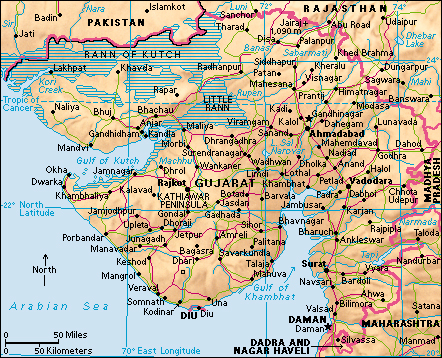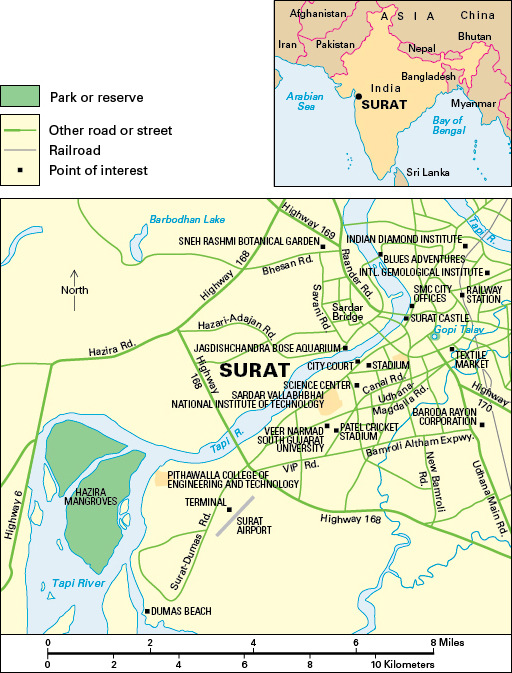Surat (pop. 4,467,797; met. area pop. 4,585,367) is a city port on the west coast of India, in the southern part of the state of Gujarat. It lies near the mouth of the Tapi (or Tapti) River. For centuries, Indian Muslim pilgrims have gone to Surat to catch boats bound for the holy city of Mecca, Saudi Arabia.


Surat was already a major port, trading with Egypt and Arabia, when the Mughal emperor Akbar (1542-1605) invaded Gujarat. Surat first came under Mughal rule in 1572. The city became the richest port of the Mughals on the west coast. In 1664, Shivaji, a Hindu chief of western India, captured and sacked Surat. In 1665, the Mughal emperor Aurangzeb sent a large force against him and forced him to agree to a treaty. The region remained under Mughal rule for nearly 200 years, until the Marathas (a Hindu people from central and southwestern India) overran the state in the mid-1700’s.
Before 1600, Portugal controlled most European trade with India and the Far East, and Surat came under Portuguese influence. During the 1600’s, two European trading companies, the Dutch and British East India companies, seized most of the Portuguese holdings and drove most of the Portuguese traders out of India. Surat was the first headquarters of the British East India Company from 1612 until 1674, at which time Bombay (now Mumbai) became the company’s main center on the west coast of India. Bombay usurped Surat’s position of dominance among India’s west coast ports in the mid-1700’s, and Surat began a long decline.
Surat’s fortunes rose again in the 1800’s as Gujarat came under the control of the British East India Company in 1818. The company ruled India until the Indian Rebellion (1857-1859), led by Indian troops. In 1858, as a result of the rebellion, the British government took control of India from the British East India Company. The British government ruled Gujarat directly, dividing the area into a number of princely states. Surat continued to thrive after Indian independence in 1947.
Surat is still known today for its silk and gold brocades, as well as other textiles. The chemical industry is important in Surat, as is the processing of diamonds. Inlay work, especially on wood, is also popular.
In 1994, Surat was the scene of an outbreak of pneumonic plague. As word of the outbreak spread, many thousands of the city’s inhabitants fled the city. The government was criticized for its slow response to the crisis, but the subsequent civic reforms introduced by a new municipal commission earned considerable media coverage and praise.
